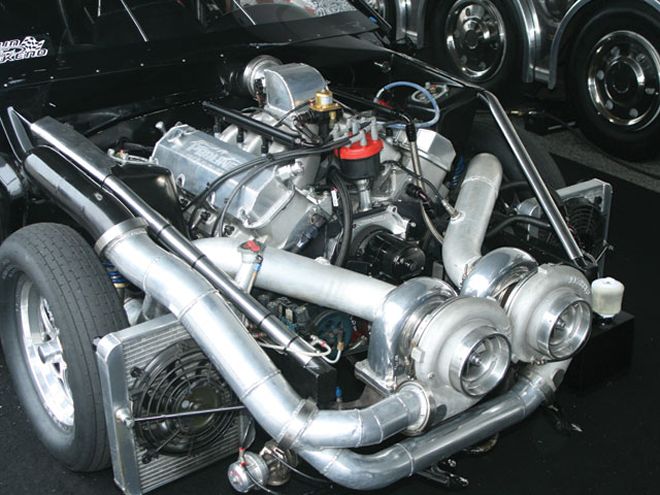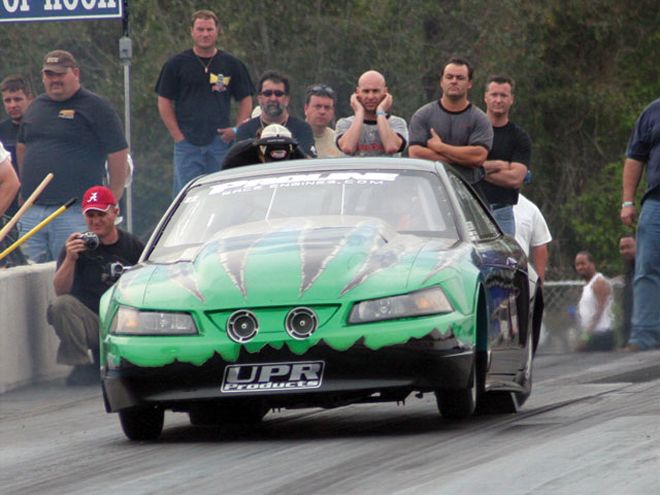

"We haven't put it on a dyno, but math for the e.t., mph, and weight tells us it's making around 3,500 hp," racer Tim Lynch tells us. Tim's Boss, Eric Dillard (who co-owns Pro Line Racing Engines with Doug Patton) added, "It consumes enough fuel to support that number." We didn't actually do the math, but we won't question their claim on the horsepower for two reasons: Lynch has a timeslip for 6.53 at 231 mph in a 3,050-pound Outlaw 10.5 car, and we've seen the size of both turbos he feeds the 620ci Ford with. Home Depot sells smaller tree chippers.

Let's put this in perspective: NHRA Pro Stock cars, typically considered the fastest stock-bodied door-slammers, tip the scales 700 pounds lighter at 2,350 (with driver) and use a considerably wider tire than Lynch's 10.5. "They 60-foot about 0.97 seconds," Lynch says. "And on my record run, I went 1.12." Still, the e.t. record in NHRA Pro Stock is 6.536, held by Greg Anderson, while the mph is Jason Line's comparatively sluggish 211.69-a whopping 20 mph slower on the big end. We weren't kidding about those turbos.
What's it take to make Lynch's '02 Mustang hit those numbers? A lot of carefully selected parts and a whole lot of tuning. "We know this engine and the car," Lynch says. "We've got it tuned. You could build that same engine, give it to someone else, and it wouldn't run that fast." Credit Steve Petty, Lynch's longtime crewchief, for the masterful tune.
As you'd expect, the laundry list of parts is awesome. Most of the individual pieces in Lynch's engine cost more than our daily driver-and they should; Lynch's engine is more reliable than our daily driver. For instance, he gets 100 or more passes out of the rods, and the lifters will last the life of the engine. We've spent less on engagement rings than the rods and Venolia pistons-and the rings weren't as pretty.
As impressive as all this is, it wasn't a one-shot fluke based on track conditions, a strong tailwind, and the moon's gravitational pull being in the right spot. Lynch says, "On our record quarter-mile pass, we were 4.34 at 177 mph in the eighth-mile, with a 1.12 60-foot. Since then, we've 1.09 60-footed and have run 4.31 at 180 mph in the eighth. We just haven't been on another quarter-mile track since our record." He adds, "We're at 100 percent fuel capacity-and we aren't running rich. People can't believe we're running that fast with just the one set of injectors. This year we're adding another row." They're also going to put new impellers in the Precision turbos. But even if they didn't change a thing, there's still something left on the table. "We really haven't leaned on it yet," Lynch says with a completely straight face. "We were running 34 pounds of boost on the record run, and usually we run 32 pounds because it's easier to get down the track. But we should be able to turn [the turbos] up to 40 pounds."
That's when he told us every 2 pounds is another 150 hp. Yikes.